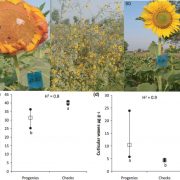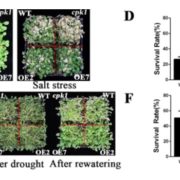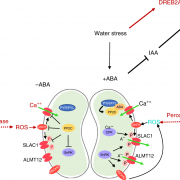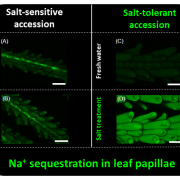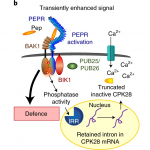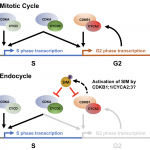Antagonistic regulation of the gibberellic acid response during stem growth in rice (Nature)
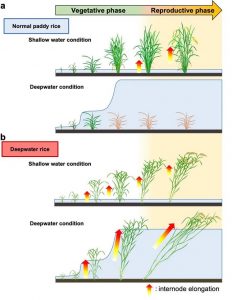 Stem growth determines the final height of graminaceous plants and greatly influences productivity in cultivated species (e.g., short internodes in semi-dwarf rice varieties to increase lodging resistance) and adaptation in wild species (e.g., elongated internodes in tall deepwater rice to help survive flooding). In this article, Nagai and coworkers identified key regulatory factors involved in the initiation of internode elongation in responde to gibberellic acid (GA), and found that genetic variation at the ACCELERATOR and DECELARATOR OF INTERNODE ELONGATION1 (ACE1, DEC1) loci accounts for differences in plant height observed in paddy rice (T65) and deepwater rice (C9285). The deepwater C9285 allele of ACE1 is responsive to GA treatment; its activation in the cell-elongation zone marks internode elongation during the vegetative phase. By contrast, the paddy T65 allele is not functional, due to a 1-bp insertion in the coding sequence. By contrast, both T65 and C9285 DEC1 alleles are functional but they differ in their expression level, likely due to variation in the promoter. Indeed, treatment with GA or deep-water conditions decrease the transcription of DEC1 in C9285, decreasing elongation inhibition, but not in T65. To conclude, genetic diversity at ACE1 and DEC1 has contributed to opposite selection processes: dwarfism selection during domestication and internode elongation selection during environmental adaptation. (Summary by Michela Osnato @michela_osnato) Nature 10.1038/s41586-020-2501-8
Stem growth determines the final height of graminaceous plants and greatly influences productivity in cultivated species (e.g., short internodes in semi-dwarf rice varieties to increase lodging resistance) and adaptation in wild species (e.g., elongated internodes in tall deepwater rice to help survive flooding). In this article, Nagai and coworkers identified key regulatory factors involved in the initiation of internode elongation in responde to gibberellic acid (GA), and found that genetic variation at the ACCELERATOR and DECELARATOR OF INTERNODE ELONGATION1 (ACE1, DEC1) loci accounts for differences in plant height observed in paddy rice (T65) and deepwater rice (C9285). The deepwater C9285 allele of ACE1 is responsive to GA treatment; its activation in the cell-elongation zone marks internode elongation during the vegetative phase. By contrast, the paddy T65 allele is not functional, due to a 1-bp insertion in the coding sequence. By contrast, both T65 and C9285 DEC1 alleles are functional but they differ in their expression level, likely due to variation in the promoter. Indeed, treatment with GA or deep-water conditions decrease the transcription of DEC1 in C9285, decreasing elongation inhibition, but not in T65. To conclude, genetic diversity at ACE1 and DEC1 has contributed to opposite selection processes: dwarfism selection during domestication and internode elongation selection during environmental adaptation. (Summary by Michela Osnato @michela_osnato) Nature 10.1038/s41586-020-2501-8


